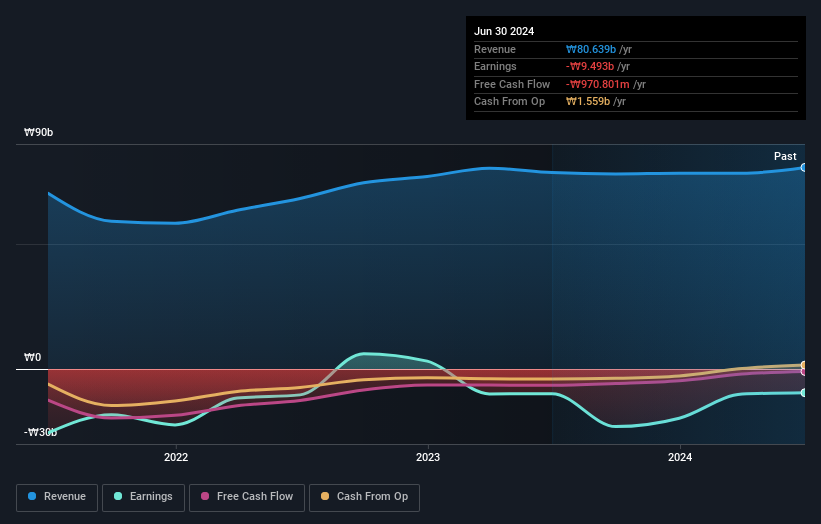- South Korea
- /
- Biotech
- /
- KOSDAQ:A042520
HansBiomed Corporation (KOSDAQ:042520) surges 12%; individual investors who own 52% shares profited along with insiders

Key Insights
- Significant control over HansBiomed by individual investors implies that the general public has more power to influence management and governance-related decisions
- 48% of the business is held by the top 11 shareholders
- 28% of HansBiomed is held by insiders
Every investor in HansBiomed Corporation (KOSDAQ:042520) should be aware of the most powerful shareholder groups. And the group that holds the biggest piece of the pie are individual investors with 52% ownership. Put another way, the group faces the maximum upside potential (or downside risk).
While individual investors were the group that reaped the most benefits after last week’s 12% price gain, insiders also received a 28% cut.
Let's take a closer look to see what the different types of shareholders can tell us about HansBiomed.
View our latest analysis for HansBiomed

What Does The Lack Of Institutional Ownership Tell Us About HansBiomed?
Small companies that are not very actively traded often lack institutional investors, but it's less common to see large companies without them.
There are multiple explanations for why institutions don't own a stock. The most common is that the company is too small relative to funds under management, so the institution does not bother to look closely at the company. Alternatively, there might be something about the company that has kept institutional investors away. HansBiomed might not have the sort of past performance institutions are looking for, or perhaps they simply have not studied the business closely.

HansBiomed is not owned by hedge funds. Ho-Chan Hwang is currently the company's largest shareholder with 25% of shares outstanding. Osstem Implant Co., Ltd. is the second largest shareholder owning 11% of common stock, and Np Growth 1Th Private Equity Fund holds about 8.7% of the company stock.
A deeper look at our ownership data shows that the top 11 shareholders collectively hold less than half of the register, suggesting a large group of small holders where no single shareholder has a majority.
Researching institutional ownership is a good way to gauge and filter a stock's expected performance. The same can be achieved by studying analyst sentiments. As far as we can tell there isn't analyst coverage of the company, so it is probably flying under the radar.
Insider Ownership Of HansBiomed
The definition of company insiders can be subjective and does vary between jurisdictions. Our data reflects individual insiders, capturing board members at the very least. The company management answer to the board and the latter should represent the interests of shareholders. Notably, sometimes top-level managers are on the board themselves.
Insider ownership is positive when it signals leadership are thinking like the true owners of the company. However, high insider ownership can also give immense power to a small group within the company. This can be negative in some circumstances.
It seems insiders own a significant proportion of HansBiomed Corporation. Insiders have a ₩37b stake in this ₩133b business. This may suggest that the founders still own a lot of shares. You can click here to see if they have been buying or selling.
General Public Ownership
The general public -- including retail investors -- own 52% of HansBiomed. With this amount of ownership, retail investors can collectively play a role in decisions that affect shareholder returns, such as dividend policies and the appointment of directors. They can also exercise the power to vote on acquisitions or mergers that may not improve profitability.
Private Company Ownership
We can see that Private Companies own 20%, of the shares on issue. Private companies may be related parties. Sometimes insiders have an interest in a public company through a holding in a private company, rather than in their own capacity as an individual. While it's hard to draw any broad stroke conclusions, it is worth noting as an area for further research.
Next Steps:
I find it very interesting to look at who exactly owns a company. But to truly gain insight, we need to consider other information, too. Consider for instance, the ever-present spectre of investment risk. We've identified 2 warning signs with HansBiomed (at least 1 which is significant) , and understanding them should be part of your investment process.
Of course this may not be the best stock to buy. So take a peek at this free free list of interesting companies.
NB: Figures in this article are calculated using data from the last twelve months, which refer to the 12-month period ending on the last date of the month the financial statement is dated. This may not be consistent with full year annual report figures.
Valuation is complex, but we're here to simplify it.
Discover if HansBiomed might be undervalued or overvalued with our detailed analysis, featuring fair value estimates, potential risks, dividends, insider trades, and its financial condition.
Access Free AnalysisHave feedback on this article? Concerned about the content? Get in touch with us directly. Alternatively, email editorial-team (at) simplywallst.com.
This article by Simply Wall St is general in nature. We provide commentary based on historical data and analyst forecasts only using an unbiased methodology and our articles are not intended to be financial advice. It does not constitute a recommendation to buy or sell any stock, and does not take account of your objectives, or your financial situation. We aim to bring you long-term focused analysis driven by fundamental data. Note that our analysis may not factor in the latest price-sensitive company announcements or qualitative material. Simply Wall St has no position in any stocks mentioned.
About KOSDAQ:A042520
HansBiomed
Engages in the research and development, production, and sale of medical materials for the procedure and the raw materials for medical supplies.
Flawless balance sheet low.


